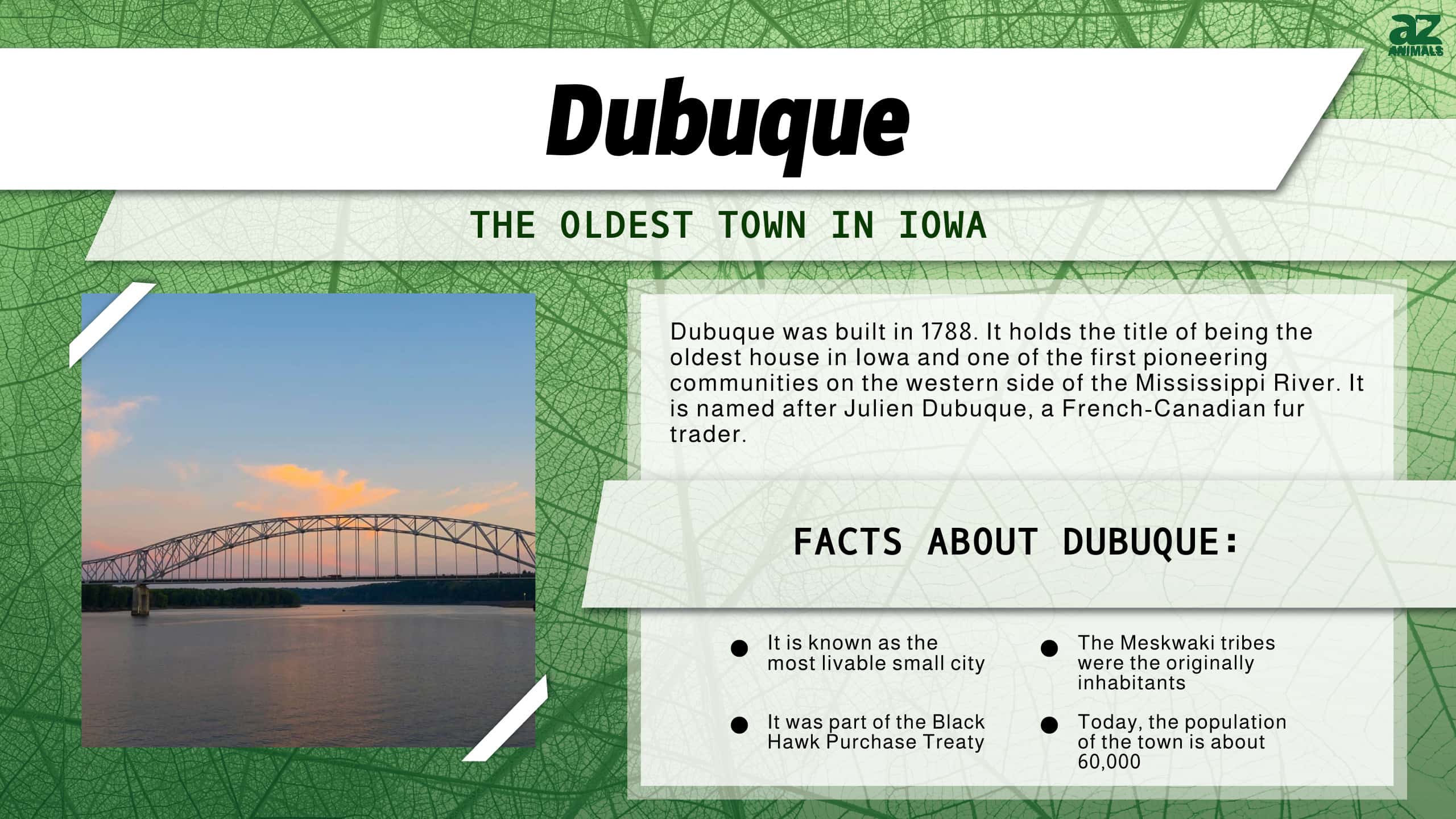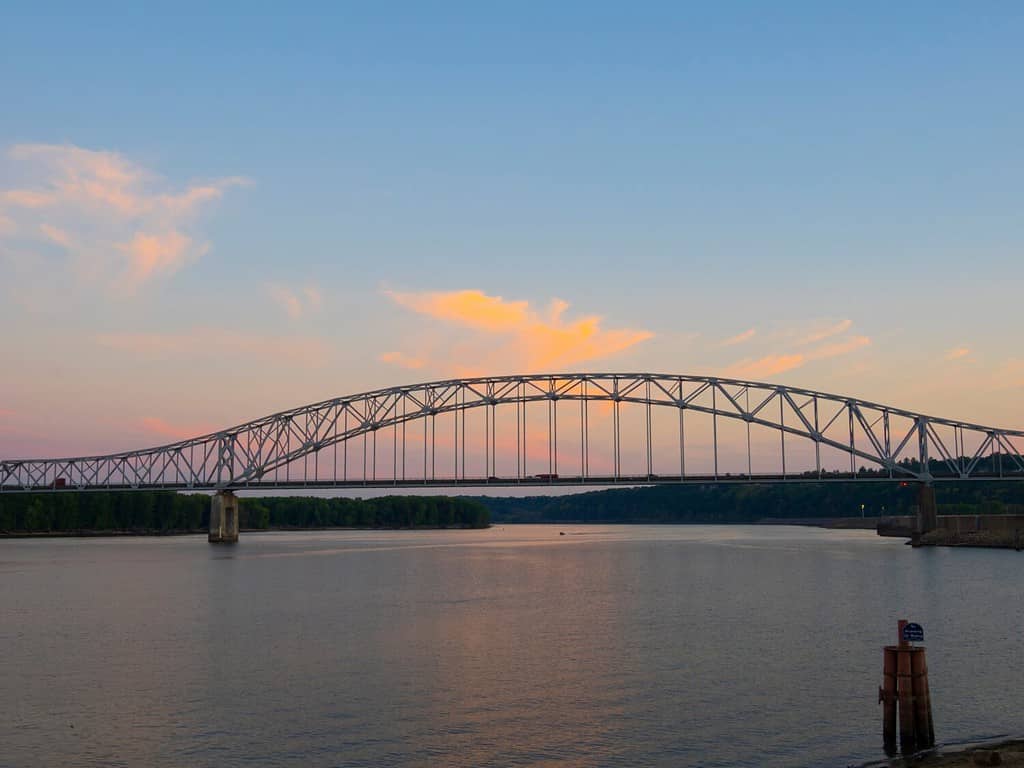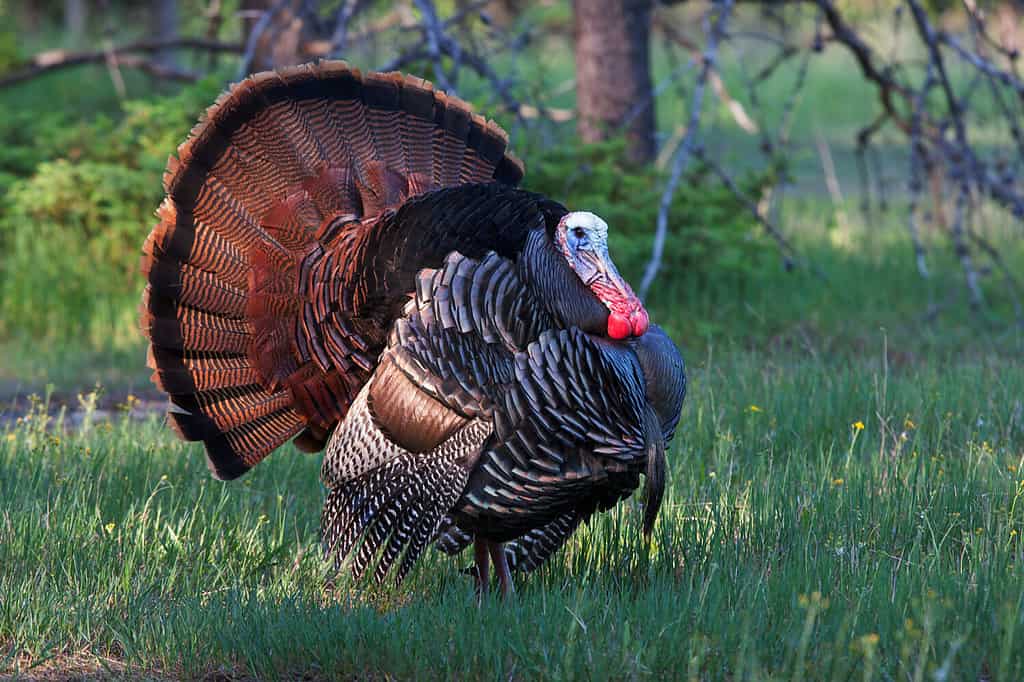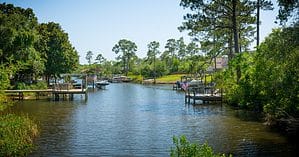
Iowa was the 29th state added to the country back in 1846. Because it’s an old state, it has some really ancient towns. Today, we’re going to talk about the oldest town in Iowa: Dubuque. This town was one of the first settlements west of the Mississippi River, so it has a lot of history, along with awesome wildlife. Today, we’ll tell you about one of the oldest cities in Iowa and the reasons why you should check it out.
History of the Oldest Town in Iowa

The oldest town in the state of Iowa is Dubuque.
©Danita Delimont/Shutterstock.com
The oldest town in the state of Iowa is Dubuque. It was one of the oldest settlements west of the Mississippi River when it was founded in 1788. Before that time, it was the Native Indians, particularly the Meskwaki tribes (known as the Red-Earth People), that called the area home for many years.
The town is named after Julien Dubuque. He was a French-Canadian fur trader who is considered to be the first permanent settler in that area. Julien Dubuque knew what no other European knew: that the area was rich in lead deposits, which was a highly after material during that time. The only reason Dubuque knew about it was because he had a close relationship with the Meskwaki Indians because of his fur trading, and they told him about the mines.
When he learned that information, he officially seized full control of the lead mines. Soon after, he named them the Mines of Spain. He worked the mines until he died in 1810.
The Government Gets Involved
It took 23 years after Dubuque’s death for the U.S. government to open the area for settlement and then charter it in 1837 as part of the Black Hawk Purchase Treaty. The town was named after Dubuque. While it started small, the town began to gain attention as the abundant resources drew in many immigrants, especially Germans and the Irish. Many of these settlers started other industries, including millworking, boat boating, and meat packing. This industrious attitude has continued until this day. Dubuque is still known as being a major medical, retail, and education center.
Trouble In The 1980s
The city was thriving for many years until the 1980s. That’s when Dubuque started to struggle due to a high unemployment rate, struggling downtown businesses, and a flow of too many residents. Seeing the issue, community leaders worked together, and during a 20-year period, they started to return the town to its former glory.
Returning To Its Original Glory
Since then, the town has had its ups and downs, but in recent years, it’s returned to being a shining spot in the state. In recent years, it was named one of the “100 Best Communities for Young People” and the “Most Livable Small City.” With many accolades, it’s no wonder why Dubuque is known as the “Masterpiece on the Mississippi.”
Where is the Oldest Town in Iowa Located on a Map?
Dubuque is located along the Mississippi River, and it’s the county seat of Dubuque County. It’s a city that’s at the junction of Wisconsin, Illinois, and Iowa. An area that the locals call the Tri-State Area. This area is part of what’s called the Driftless Area, which is the section that was able to avoid catastrophe during all three phases of the Wisconsin Glaciation, which radically changed the geography of the area.
The city is 31.22 square miles, and only 1.25 square miles of that is covered with water. As of the 2020 census, there is a population of about 60,000.
There are several sections of Dubuque, including the downtown area, where you’ll find many of the cultural and government institutions. Another section is the North End, which was settled during the 19th century by German immigrants. It’s a working-class neighborhood with great churches and historical landmarks.
There’s also the South End, which is a traditionally Irish neighborhood known for St. Raphael’s Cathedral and Valentine Park. Finally, there’s the West End, which was settled after World War II. It’s a large suburban area with many families, parks, and plazas.
Wildlife You’ll Find in Dubuque

You’ll see many unique birds in Dubuque, including wild turkey.
©Jim Cumming/Shutterstock.com
You’ll find a lot of amazing wildlife in the oldest town in Iowa, including a number of different species of arthropods, hexapods, insects, and mollusks.
Birds
There are a number of classic bird species in Dubuque County. Select species include cardinals, bald eagles, mourning doves, hummingbirds, woodpeckers, blue jays, great horned owls, wild turkeys, and more.
Mammals
Depending on what time of year you come around, you’ve got a good chance at seeing several different mammals. Keep a look out for deer, coyote, red fox, several species of bat, weasels, and shrews.
Reptiles
Dubuque is home to several species of snake, including garter, milk snake, gopher snake, and hognose snake. There are also painted and snapping turtles.
Fish
There are numerous species of fish in the lakes, including trout, carp, sunfish, dace, and sturgeon.
Plants
Finally, there are many plant and flower species in Dubuque, including pokeweed, snakeroot, bellflower, box elder trees, ferns, red clover, dandelion, and more.
Conclusion
This has been your tour of the oldest town in Iowa: Dubuque. It’s a fascinating town that has a significant place in history. There are also many awesome animals to discover, so consider a visit if you’re ever in the area.
The photo featured at the top of this post is © jerseyjoephoto/Shutterstock.com
Thank you for reading! Have some feedback for us? Contact the AZ Animals editorial team.







